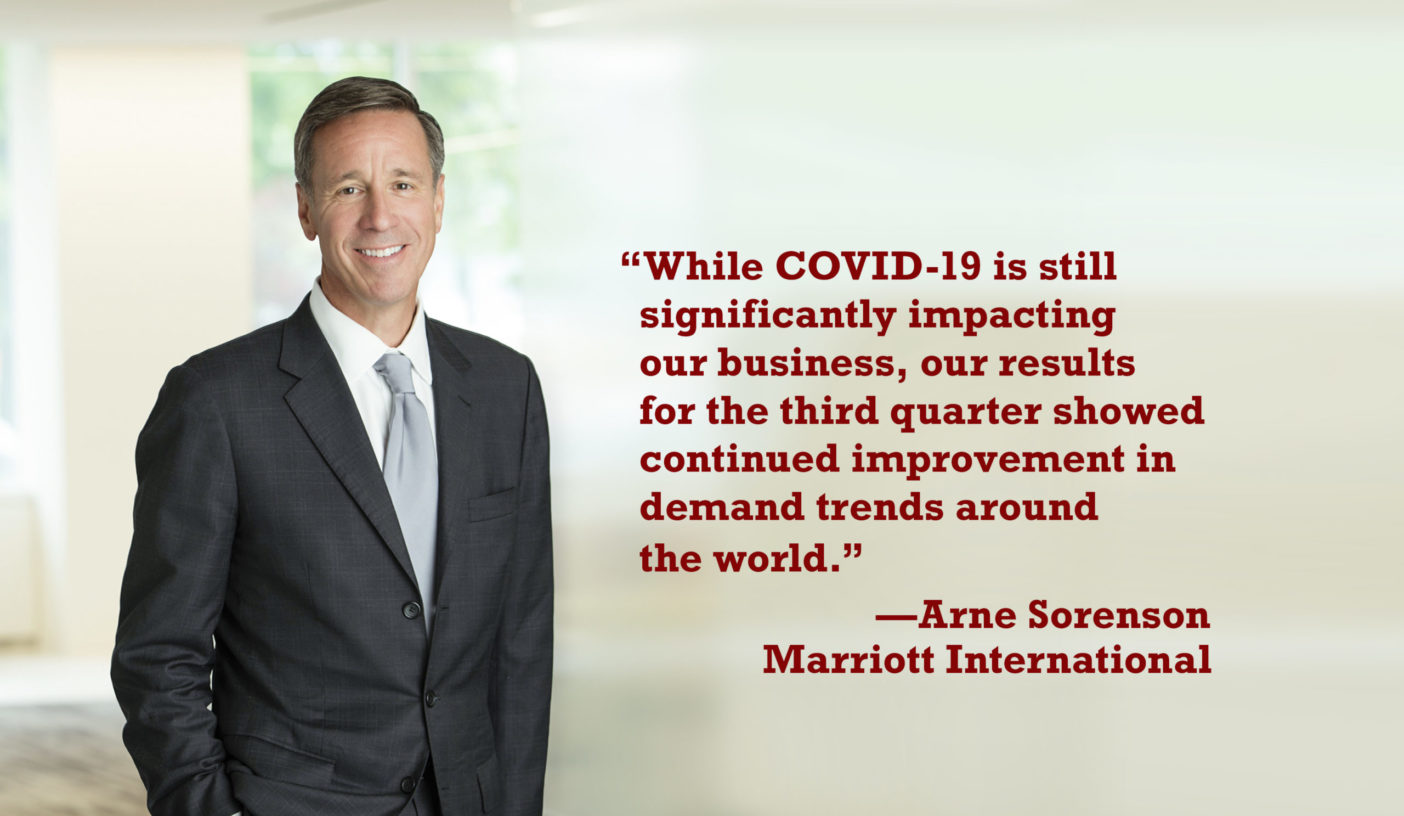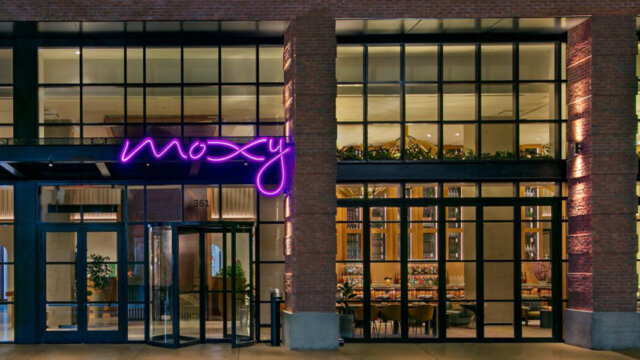BETHESDA, MD—Marriott International, Inc. reported third quarter 2020 results which were dramatically impacted by the COVID-19 global pandemic and efforts to contain it. Global RevPAR declined 65.9% worldwide, 65.4% in North America and 67.4% outside North America, compared to the 2019 third quarter.
Arne Sorenson, president/CEO of Marriott International, said, “While COVID-19 is still significantly impacting our business, our results for the third quarter showed continued improvement in demand trends around the world. Worldwide RevPAR declined 66% in the quarter, a nearly 19-percentage point improvement from the decline in the second quarter. Greater China continues to lead the recovery and demonstrates the resiliency of travel demand, with third-quarter occupancy of 61% and RevPAR recovering to down 26%, a 35-percentage point improvement compared to the decline in the second quarter. Third quarter occupancy at our hotels in North America reached 37%, nearly double occupancy in the second quarter, primarily driven by leisure, drive-to demand, with business and group recovering more slowly. Globally, 94% of our hotels are now open and welcoming guests.”
Third-Quarter Highlights
- Reported diluted EPS totaled 31 cents, compared to reported diluted EPS of $1.16 in the year-ago quarter. Q3 adjusted diluted EPS totaled 6 cents, compared to Q3 2019 adjusted diluted EPS of $1.47. Q3 2020 impairment charges related to COVID-19 impacted reported and adjusted diluted EPS by 7 cents
- Reported net income totaled $100 million, compared to reported net income of $387 million in the year-ago quarter. Q3 adjusted net income totaled $20 million, compared to Q3 2019 adjusted net income of $488 million. Q3 2020 impairment charges related to COVID-19 impacted reported and adjusted net income by $24 million after-tax
- Adjusted EBITDA totaled $327 million, compared to Q3 2019 adjusted EBITDA of $901 million
- The company added more than 19,000 rooms globally during the third quarter, including roughly 1,400 rooms converted from competitor brands and approximately 7,600 rooms in international markets. Net rooms grew 3.8% from the year-ago quarter;
- At quarter-end, Marriott’s worldwide development pipeline totaled nearly 2,900 hotels and more than 496,000 rooms, including roughly 25,000 rooms approved, but not yet subject to signed contracts. Approximately 228,000 rooms in the pipeline were under construction as of the end of the third quarter
- In the 2020 third quarter, worldwide RevPAR declined 65.9 percent (a 65.9 percent decline using actual dollars). North American RevPAR declined 65.4 percent (a 65.4 percent decline using actual dollars), and international RevPAR declined 67.4 percent (a 67.3 percent decline using actual dollars).
“The Asia-Pacific region led deal signings in the third quarter, accounting for more than half of all rooms signed globally, with the vast majority of those rooms in Greater China,” said Sorenson. “During the third quarter, we added more than 19,000 rooms to our system, nearly 70% more than were added in the second quarter, achieving 5% gross rooms growth in the last 12 months. At quarter-end, approximately 228,000 rooms of our more than 496,000-room pipeline were under construction. Progress on projects under construction largely continues apace around the world, although we have designated a slightly higher number of projects on hold given macroeconomic uncertainty and discussions with our owners. For full-year 2020, we now expect 2.5 to 3% net rooms growth, including terminations of 1.5 to 2%. Assuming progress is made in containing COVID-19, we would expect gross room additions in 2021 to accelerate compared to our expectations for 2020.
He continued, “Although the timing of a full recovery remains unpredictable, we are pleased with the significant progress we have made in restructuring and repositioning the company to successfully manage through these challenging times. Financially, we have strengthened our liquidity position, realigned our cost structure and minimized our cash burn. We have also remained keenly focused on working with our hotel owners and franchisees to significantly reduce hotel level costs and help preserve cash in this extremely low revenue environment. Operationally, we have elevated our health and cleanliness standards to establish trust and credibility with travelers and to enhance the safety and wellbeing of our associates and guests. We still have a long road ahead, but this crisis will come to an end, and I believe travel will rebound quickly. I am confident that the many steps we have taken this year, combined with our unrivaled global portfolio, the strength of our brands and the power of Marriott Bonvoy position us very well now and for the future.”
Third Quarter 2020 Results
Marriott’s reported operating income totaled $252 million, compared to Q3 2019 reported operating income of $607 million. Reported net income totaled $100 million, compared to Q3 2019 reported net income of $387 million. Reported diluted earnings per share (EPS) totaled $0.31 in the quarter, compared to reported diluted EPS of $1.16 in the year-ago quarter. Reported results in Q3 2020 included impairment charges of $32 million pretax ($24 million after-tax and 7 cents per share), related to COVID-19.
Adjusted operating income totaled $147 million, compared to Q3 2019 adjusted operating income of $734 million. Adjusted operating income included impairment charges of $32 million, related to COVID-19.
Adjusted net income totaled $20 million, compared to Q3 2019 adjusted net income of $488 million. Adjusted diluted EPS totaled 6 cents, compared to adjusted diluted EPS of $1.47 in the year-ago quarter. These Q3 2020 adjusted results included impairment charges of $24 million after-tax (7 cents per share), related to COVID-19. Adjusted results exclude restructuring and merger-related charges, cost reimbursement revenue and reimbursed expenses.
Base management and franchise fees totaled $366 million, compared to base management and franchise fees of $821 million in the year-ago quarter. The year-over-year decline in these fees is primarily attributable to RevPAR declines related to COVID-19 and a decrease in other non-RevPAR related franchise fees. Other non-RevPAR related franchise fees in Q3 2020 of $119 million were $26 million, or 18%, lower than the year-ago quarter, largely due to lower credit card branding fees.
Incentive management fees totaled $31 million, compared to incentive management fees of $134 million in the year-ago quarter. The year-over-year decline in these fees is primarily attributable to lower net house profits at many hotels related to COVID-19. Roughly three-quarters of the incentive management fees recognized in the quarter were earned at hotels in the Asia-Pacific region.
Contract investment amortization for totaled $48 million, compared to $16 million in the year-ago quarter. The year-over-year change reflects impairments of investments in management and franchise contracts related to COVID-19.
Owned, leased and other revenue, net of direct expenses, totaled an $18 million loss, compared to $67 million of profit in the year-ago quarter as a result of RevPAR declines related to COVID-19.
General, administrative and other expenses totaled $131 million, compared to $220 million in the year-ago quarter. Expenses in Q3 2020 reflect the company’s cost reduction efforts.
Restructuring and merger-related charges totaled $1 million, compared to $9 million in Q3 2019. Charges in Q3 2020 reflect $40 million of costs related to the company’s organizational realignment, largely offset by a $39 million reduction of the non-tax-deductible accrual for the fine imposed by the U.K. Information Commissioner’s Office in relation to the data security incident disclosed in November 2018.
Interest expense, net, totaled $107 million, compared to $92 million in the year-ago quarter. The increase is largely due to higher long-term debt balances and higher interest expense associated with new debt issuances.
Adjusted earnings before interest, taxes, depreciation, and amortization (EBITDA) totaled $327 million, compared to Q3 2019 adjusted EBITDA of $901 million.
Selected Performance Information
The company added 127 new properties (19,064 rooms) to its worldwide lodging portfolio during the quarter, including roughly 1,400 rooms converted from competitor brands and approximately 7,600 rooms in international markets. Thirty-one properties (6,066 rooms) exited the system during the quarter. At quarter-end, Marriott’s global lodging system totaled roughly 7,600 properties and timeshare resorts, with nearly 1,414,000 rooms.
At quarter-end, the company’s worldwide development pipeline totaled 2,899 properties with more than 496,000 rooms, including 1,201 properties with approximately 228,000 rooms under construction and 160 properties with roughly 25,000 rooms approved for development, but not yet subject to signed contracts.

